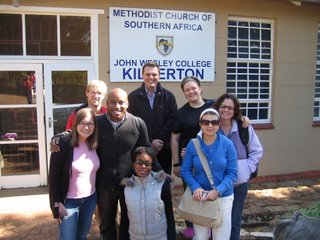UPDATE
Please find a 'semi' final version of the Bible Study here (nothing that I write is ever final):
The first file is a copy of the Bible study in MS Word Format. SYNOD Bible study 2006.doc
The second file is a copy of the Powerpoint slides that accompany it. SYNOD Bible study 2006.ppt
It was wonderful to see the spirited response to the message at SYNOD! I felt the stirings of a revival!
ha ha!
Blessings,
D
The same Gospel in an ever-changing world.
Some thoughts I put together for a Bible study for the Limpopo District SYNOD (it is not yet complete....)
INTRODUCTION.
Firstly, let me bring you the greetings and best wishes from the students and staff of the greatest Theological Seminary in the world. As my students have taught me, Bishop Taylor, the vice Chair of the District, Colleagues, sisters and brothers in Christ (all protocol observed), I greet you in the name of Jesus Christ our Lord and Saviour. Amen.
I am extremely grateful to Bishop Taylor for asking me to share with you today on the theme of The Church's mission in the world.
A few weeks ago the MCSA's Connexional Secretary addressed the 40 odd graduates at John Wesley College. In his address he made reference to a quote which left me thinking, and has shaped this Bible study today. The quote is from Bishop Graham Gray (Bishop of York) who said: "The gospel must be constantly forwarded to a new address because the recipient is always changing his place of residence."
And so today, I have chosen the theme of "The same Gospel in an ever-changing world".
In investigating this them we will look at a Mission Cameo from the Bible that faced this same challenge, we will look at the account of the Mission of the Early Church as it is recorded in the book of the Acts of the Apostles.
1. A few facts about the book of Acts.
This may be old news to some of you here, but let?s just remind ourselves about the purpose, nature and content of this wonderful book so that we can better grapple with the subject of ?the same Gospel in a ever-changing world?.
- The Book of Acts, as we know, was written by Luke, the author of the Gospel that bears his name. Whereas Luke's Gospel was intended to tell the story of the life and miraculous works of Jesus that lead to salvation, the Acts of the Apostles is written by the same author, to the same person, to tell of the wonderful that God has done through the power of the Spirit in the early Church. In fact William Barclay goes as far as saying the Acts of the Apostles is the most important book in the New Testament since it tells of the kick start of mission and the transfer of God's power from God?s son, to God?s chosen in the Church!
- What is of interest is that much of Acts is written from Luke?s own travel diary (as such he may have accompanied Paul on some of his missionary work). There are three particular sections where Luke employs the first person plural (we) to describe events - Acts 16:10-17, 20:5-21:18, and 27:1-28:16.
- The book is written to a believer, which is what makes it so useful for us. Luke addresses the book to a man called 'Theophilus' (Luke 1:3, and Acts 1:1). Theophilus is unlikely to be a name (since it is not common in those times), rather it is a combination of two Greek words, theos meaning God, and philein which means to love or have deep familial affection for (brotherly love). As such we can see that it was likely to have been written by Luke for someone who was a "lover of God".
- I have already briefly touched on the reason why Luke wrote this Chronicle called Acts, but let?s just flesh out a few suggestions:
o He wrote the book to commend the Christian faith, and the good and honourable work of Christians, to the Roman government (in fact some have suggested that 'Theophilus' was a high ranking Roman official who may have had some say in the trial of Paul ? before is execution in Rome, and that Luke?s intent was to write to this 'lover of God' to convince him that Christians are not subversive of the Roman Empire. This could certainly account for the reason why the account of Paul's life ends with him jailed in Rome.
o HOWEVER, the clearest indication of Luke?s intent in writing this chronicle can be found in one particular verse near the beginning of the book, Acts 1:8.
2. God's Missiological purpose for the SAME church in an EVER-CHANGING world, based on Acts 1:8 ? a hermeneutic key.
The verse reads as follows:
But you will receive power when the Holy Spirit has come upon you; and you will be my witnesses in Jerusalem, in all Judea and Samaria, and to the ends of the earth.
In Biblical scholarship we would call a verse such as this a 'hermeneutic key'. Hermeneutics is the science of interpretation. This verse is thus a key that unlocks the interpretation of the whole book. Many books in the Bible have such verses (see as another clear example of a 'hermeneutic key' John 20:30-31 as verses that unlock the interpretive purpose of the whole of that Gospel).
This interpretive key gives us two significant insights:
a. It shows us where the power comes from for true mission as a lasting, living and powerful change of lives and communities.
But you will receive power when the Holy Spirit has come upon youb. The second part of this verse
and you will be my witnesses in Jerusalem, in all Judea and Samaria, and to the ends of the earth, gives a very clear outline of how the Gospel message spread from it's early start among a band of about 30 Jewish men and women, to a world changing faith that transformed the whole of the world and history as we know it today. However, Luke had to make a record of how the SAME GOSPEL had been forwarded to DIFFERENT locations. In other words, how God's mission had lead the early Church to break out of its complacency, out of its comfort zone, to become bold, non-conformist and engage society for the sake of it?s salvation and the love of God. We can chart this growth and expansion of the Gospel from Jerusalem (Acts 1:1-7:60) which ends with the martyrdom of Stephen and the scattering of the Saints through Judea and Samaria (Acts 8:1-40), then the conversion of Saul (Acts 9:1-43) and the subsequent spread of the Gospel throughout the whole known world (even to the very end?. Rome).
Let's deal with the first aspect of the hermeneutic key -
2.1. Mission in the power of the Holy Spirit.I believe it was L Ron Hubbard, the founder of Christian Scientology, who said that
If your religion doesn?t change you, then its time to change your religion. Well friends, let me tell you, that what we read about in the book of Acts is nothing short of an explosive world changing encounter with Almighty God!
Luke uses the voice of Christ himself to say:
But you will receive power when the Holy Spirit has come upon you; and you will be my witnesses.
Power. The first thing that we learn about this life-changing mission is that it was a power based faith! Just this week I read an internet article written by a friend who was lamenting the state of the Church, he writes of his personal despair at having to go to SYNOD and sit through hours of meaningless business and boring debate. He writes:
This Church Synod will discuss the dwindling congregational numerical returns, the financial struggle to pay salaries, how to keep gay people out of the church, and the jockeying for position of various clergy intent on becoming the next Bishop!
He ended his article by asking the question whether anything of substance or change would come out of the SYNODS this year? I was challenged by these thoughts. When last did we leave a SYNOD full of the power of the Holy Spirit? The interesting thing about this passage that we read today it foretells of the pitfall that the institutionalised Church would find itself in some 2000 years later. This statement of Jesus about God pouring out God?s spirit in power is as a result of a question asked by the disciples:
v.6. Lord, are you at this time going to restore the Kingdom to Israel?
This is a very telling statement. It shows two very clear misunderstandings of the Power that the Gospel has to change society and human lives.
Firstly, it is a passive faith. It asks "are
you going to restore", and "... the Kingdom
TO Israel...". I see this attitude reflected in many Churches across the world. We have become passive, expecting God to act FOR us. At very least we expect the SYNOD, the Conference, the Bishop, the Superintendent, the Minster, the Local Preacher... to set the Missional agenda FOR us. This is not where to Power of God comes in to change. The Power of God acts within you, when you love Christ. You have to love his world! You have to love the old and the young, the rich and the poor, the gay and straight. Don?t look to someone else to love the world for you. Jesus uses the word you
humas (Greek, it is the accusative object of the verb, second person singular). Jesus does not say 'they', or 'them'. It is not in the third person. It is YOU! Change and power starts with you! When last did YOU take responsibility for mission? When last did you ask God what God's will is for your community? Friends, it is time to stop looking elsewhere. We will have to give an account of how we lead and pastored our churches.
Secondly, they show a clear misunderstanding of where the power comes from. The Greek word, for power, used here is
dunamin, from which we get our English word 'dynamite'! Jesus points out to them that when they wait upon God, and follow God's agenda for their lives they will receive a power which is far greater than any political or organisational power could ever be! Jesus promises a NEW POWER, the POWER of God himself. The word
dunamin comes from the Greek root
dunamai which means 'to be able', or to be enabled or empowered.
So, Jesus tells the religious, the holy, the followers, of his day... the kind of power that you need to truly transform society is not status, it is not wealth, it is not political. You don?t need to be a Bishop to change the world, what you need to be is connected to God by the power of the Holy Spirit!
True change and transformation in ministry can only come from a true connection with God in the Holy Spirit. Let's be honest, many of our members, in fact many of our ministers, need nothing more than to be saved! Our ministry is ineffective and powerless because we no longer know God!
So, when I wrote to my friend and responded to his dismay about the SYNOD I said:
My hope for the Church lies not in the SYNOD, not in those of us who think that we have known God for a long time? My hope lies in the Sunday school! It lies with those who are discovering and falling in love with Christ for the first time!
True power in the Spirit, dynamite power, the power of Acts that changes the whole world, comes not from prestige, or position, it comes from passion! Passion for God in Christ.
How is your passion doing? If you have forgotten God, then today make yourself right with him!
The Holy Spirit.Jesus said:
But you will receive power when the Holy Spirit has come upon you;The interesting thing about the structure of this sentence (
epelthontos tou hagiou pneumatos eph humas) is that it is in the Genitive absolute and is simultaneous in time with the preceding verb 'shall receive' (
lempsesthe). What does that mean!?
It means simply that the only time that you receive power is in the moment that the Holy Spirit descends upon you. The same structure is employed in Jesus' sentence in John 15:4 concerning Christians bearing true fruit for Christ, "Remain in me, and I will remain in you. No branch can bear fruit by itself; it must remain in the vine. Neither can you bear fruit unless you remain in me".
It is essential that we receive this POWER to be Christ's witnesses, why? Because the witness is costly, it is difficult, it takes more than just commitment, it takes personal sacrifice!
My witnesses. and you will be my witnesses (
mou martures). The Greek word witness is the word
martures from which we derive the English word 'Martyr'. A Martyr is someone who give up their very life for the Christian faith.
I wonder if Jesus knew how his disciples would die for their faith when he said these words? Of the twelve disciples, 11 would be killed for their faith. And the witness of the Power of God would be strong within them, that Peter (the one who was so afraid that he denied Christ three times, even denying him to a slave girl) asks to be crucified upside down because he believed he was not worthy to be crucified in the same manner as his Lord.
Perhaps our witness is not costly enough. Perhaps it is too cheap. Maybe that is why we no longer offer our lives for the faith. Even clergy are afraid to sacrifice their lives for the cause of Christ. When last did you witness to Christ, I mean actually suck up your courage and go over to a person and say "I want to tell you about someone who loves you". Let me say, our laity will never do it until we are prepared to do it.
The saddest thing about the modern Church is that it has become a
FORT instead of a
PORT. We have closed ourselves in from the world, we retreat here to escape race (in society our Children school together, our spouses work side by side with people of all races. Yet on Sunday we worship separately. In society people who are differently abled are catered for. There are ramps for their wheelchairs and sign linguists for their communication. In the Church we have stairs, spoken sermons and uniforms.
I recently found this incredible video. It speaks volumes about the modern Church.
http://www.stillspeaking.com/media/ - SEE THE EJECTOR PEW! I wish more Churches were accepting rather than rejecting!
Friends, witnessing for the Gospel of Christ demands more than our time. It demands our lives. It demands that we place ourselves in the hands of God and say "spend me, spend me generously, for your sake and for the world". We should be a PORT that sends forth change and renewal, not a FORT that cuts us off from the change in the world.
Remember the words of Bishop Gray who said:
"The gospel must be constantly forwarded to a new address because the recipient is always changing his place of residence."
So, how and where does this mission birthed in the Power of God's Spirit, constantly connected and costly take place?
2.2. The location of God's Mission through the Church.
2.2.1. I MUST SHARE WITH THOSE IN MY WORLD - JERUSALEM.
2.2.2. I MUST DARE TO REACH BEYOND MY WORLD - ALL JUDEA AND SAMARIA.
2.2.3. I MUST CARE ABOUT THE WHOLE WORLD - TO THE ENDS OF THE EARTH.
CONCLUSION.








 .
.
 .
.




